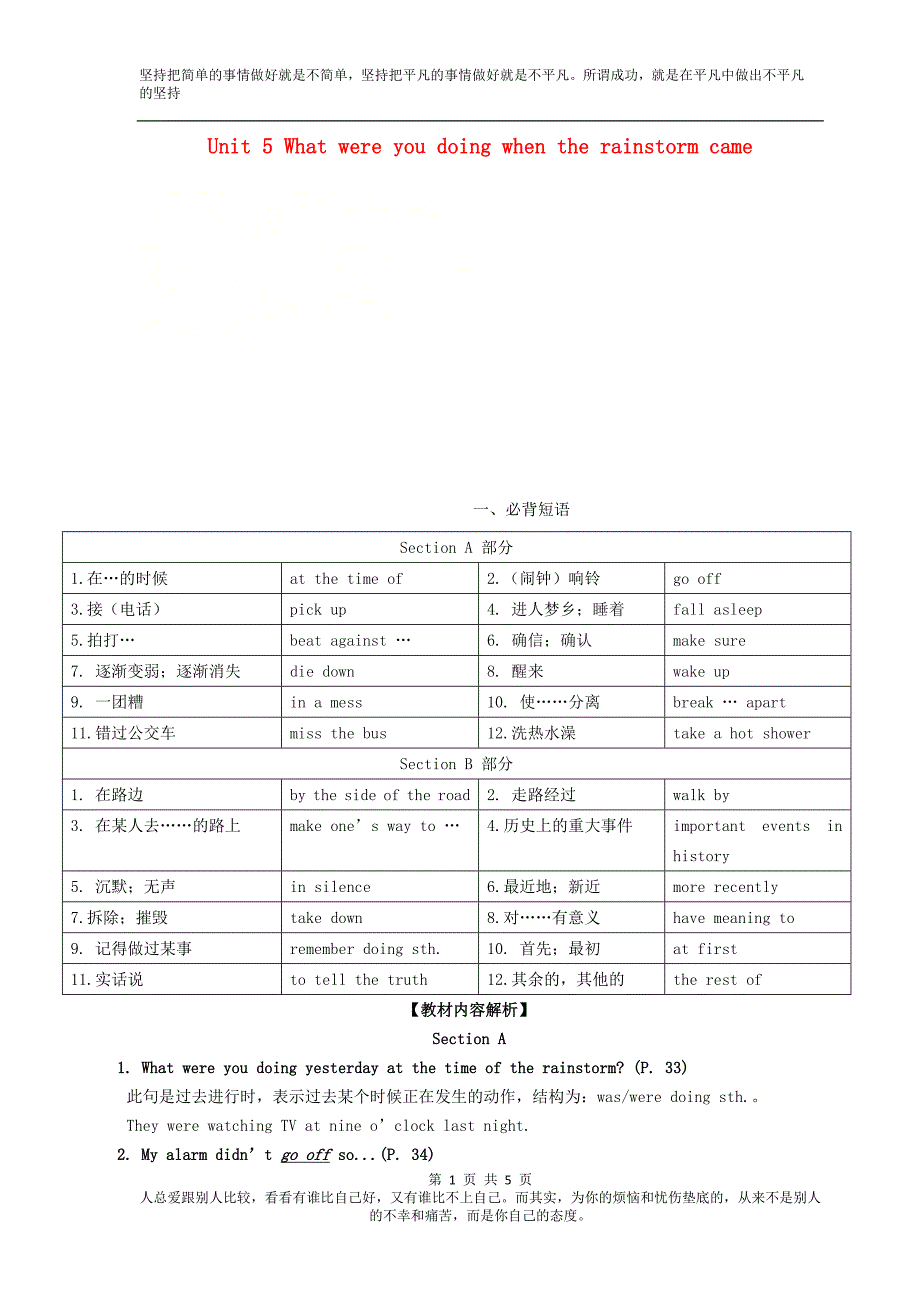 八年级英语下册Unit5Whatwereyoudoingwhentherainstormcame短语语法知识点汇总新版人教新目标版
八年级英语下册Unit5Whatwereyoudoingwhentherainstormcame短语语法知识点汇总新版人教新目标版



《八年级英语下册Unit5Whatwereyoudoingwhentherainstormcame短语语法知识点汇总新版人教新目标版》由会员分享,可在线阅读,更多相关《八年级英语下册Unit5Whatwereyoudoingwhentherainstormcame短语语法知识点汇总新版人教新目标版(5页珍藏版)》请在装配图网上搜索。
1、坚持把简单的事情做好就是不简单,坚持把平凡的事情做好就是不平凡。所谓成功,就是在平凡中做出不平凡的坚持Unit 5 What were you doing when the rainstorm came一、必背短语Section A 部分1.在的时候at the time of2.(闹钟)响铃go off3.接(电话)pick up4. 进人梦乡;睡着fall asleep 5.拍打beat against 6. 确信;确认make sure 7. 逐渐变弱;逐渐消失die down8. 醒来wake up 9. 一团糟in a mess 10. 使分离break apart11.错过公交车m
2、iss the bus12.洗热水澡take a hot showerSection B 部分1. 在路边by the side of the road2. 走路经过walk by3. 在某人去的路上make ones way to 4.历史上的重大事件important events in history5. 沉默;无声in silence6.最近地;新近more recently7.拆除;摧毁take down8.对有意义have meaning to9. 记得做过某事remember doing sth.10. 首先;最初at first11.实话说to tell the truth12
3、.其余的,其他的the rest of【教材内容解析】Section A1. What were you doing yesterday at the time of the rainstorm? (P. 33)此句是过去进行时,表示过去某个时候正在发生的动作,结构为:was/were doing sth.。They were watching TV at nine oclock last night.2. My alarm didnt go off so.(P. 34)go off此处表示“发出响声”,还可以表示“爆炸、离开、停止运转”。The alarm went off at 7 a.m
4、. yesterday.A bomb went off just now. Danny decided go off on his own. 3. I called at seven and you didnt pick up. (P. 34)pick up意为“接电话”,相当于answer the phone。Why dont you pick up/answer the phone?【拓展】pick up还可以表示“捡起、开车接送”。My pen is under your desk. Can you pick it up for me?Can you pick me up at the
5、station?4. I called again at eight and you didnt answer then either. (P. 34)also, too, as well与either都可以表示“也”,但是用法不同。also放在句中行为动词前,be动词、助动词和情态动词之后。He also wants to go.too用于肯定句中,放在句尾,前面用逗号隔开。He wants to go, either.as well用于肯定句中,放在句尾,前面不用逗号隔开。He wants to go as well.either用于否定句句末。He doesnt want to go e
6、ither5. With no light outside, it felt like midnight. (P. 35)(1) with这里用作介词,表示伴随状况,意为“由于、因为”。With John away, theres more room in the house.(2) feel like表示“感觉像、感觉好似”The interview only took ten minutes, but it felt like hours.【拓展】feel like还可以表示“想要”,后接动词时,用doing的形式。He didnt feel like going swimming.6.
7、Bens dad was putting pieces of wood over the windows while his mom was making sure the flashlights and radio were working. (P. 35)make sure意为“确保”,后接of短语或者that从句。I tried to make sure of the problem.Make sure that no one finds out about it.7. She also put some candles and matches on the table. (P. 35)
8、match此处用作名词,表示“火柴”。Dont let your children play with matches.【拓展】match用作名词还可以表示“比赛”,用作动词,意为“般配”。Our team won the football game.This pair of shoes match your dress well.8. Ben was helping his mom make dinner when the rain began to beat heavily against the windows. (P. 35) (1) beat用作动词,表示“敲打、拍打”,还可以表示“
9、战胜、打败”,宾语是对手。They beat drums to cheer up the players.I beat her at swimming yesterday.(2) against用作介词,表示“碰、撞”。The rain beat against the windows.【拓展】against用作介词,还可以表示“倚着、靠着”或者“反对”。The worker put the leader against the wall.We were rowing against the current.They are against building a factory here.9.
10、 He finally fell asleep when the wind was dying down at around 3:00 a.m. (P. 35) die down意为“逐渐变弱、逐渐消失”。The wind finally died down.10. When he woke up, the sun was rising. (P. 35) (1) wake sb. up意为“把某人唤醒”,wake up意为“醒来”。His mother often wakes him up at 6:00 in the morning.I usually wake up at 6:30.(2)
11、 rise(rose, risen, rising)不及物动词,意为“升起,上升”辨析:rise与raiserise不及物动词意为“升起,上升”The water in the river rose after the heavy rain.The sun rises in the east and sets in the west.raise及物动词意为“提高,筹集,抬高,举起”The worker want the boss to raise their wages(工资).The teacher asks us to raise our hands if we have question
12、s.We should try our best to raise more money for the poor family.11. Although the storm broke many things apart, it brought families and neighbors closer together. (P. 35) break.apart意为“把折断;把分开”。The strong wind broke the branches apart.Rumors broke the two close friends apart.Section B1. Kate realiz
13、ed her bag was still at home. (P. 37)realize用作及物动词,意为“理解、领会、意识到”,后接名词、代词或者从句作宾语。He didnt realize his mistake.The man laughed when he realized what happened.2. When the school basketball competition started, Kate was still making her way to school. (P. 38)make ones way to意为“前往”,后接表示地点的名词。We slowly ma
14、de our way to the mall through the crowd.3. Robert Allen is now over 50, but he was a school pupil at that time. (P. 38)over此处表示“超过、多于”,相当于more than。She stayed in Lagos for over a month.He is over sixty.4. We were eating dinner in the kitchen when we heard the news on the radio. (P. 38)on the radio表
15、示“通过广播、通过录音机”,on此处用作介词,表示“借助、以某种方式”,后常接表示媒介的名词。She is watching the show on TV.5. My parents did not talk after that, and we finished the rest of our dinner in silence. (P. 38)(1) rest此处表示“其余的部分”,the rest of意为“其余的、其它的”,后可接可数名词后者不可数名词,当在句中作主语时,谓语动词的单复数与of后面的名词保持一致,若of后面的名词是单数可数名词或者不可数名词,谓语动词用单数形式;若of后
16、面的名词是可数名词复数,谓语动词用复数形式。The rest of the money is on the desk.Some of the students are reading in the classroom and the rest of them are on the playground.(2) in silence意为“沉默、无声”。She stood by the window in silence for a long time.6. More recently, most Americans remember what they were doing when the W
17、orld Trade Center in New York was taken down by terrorists. (P. 38)(1) recently用作副词,意为“近来、最近”,常与现在完成时连用。Have you called your mother recently?(2) take down意为“拆除、拆掉”,还可以表示“写下、记下”。Could you please help me take down this tent?I forgot to take down his telephone number.7. I didnt believe him at first, bu
18、t then I looked out of the window and realized that it was true. (P. 38)at first意为“起初、起先”,多用于句首或者句尾,暗示与后来的动作或者情况不同,与at last“最后、最终”相对。The work was hard at first, but I got used to it later.8. I was so scared that I could hardly think clearly after that. (P. 38)hardly用作副词,表示“几乎不、几乎没有”。She hardly ate a
19、nything today.There is hardly any milk left in the ridge.9. Kate didnt think her friend was telling the truth about the event. (P. 39)truth用作名词,表示“实情、事实”,to tell the truth表示“说实话”,放在句中作插入语,用逗号同句子其它成分隔开。I must tell you the truth.【语法讲解】过去进行时1. 基本概念:过去进行时表示在过去某一时刻或一段时间内正在进行的动作。这一特定的过去时间除有上下文暗示以外, 一般用时间状
20、语来表示。2. 结构 was / were ( not ) + 动词-ing3. 句式肯定式:I/He/She/It was working. We/You/They/ were working.否定式:I/He/She/It was not working.We/You/They/ were not working.疑问式和简略回答:Was I working? Yes, you were. No, you were not. Were you working? Yes, I was. No, I was not. Was he/she/it working? Yes, he/she/it
21、was. No, he/she/it was not. Were we/you/they working? Yes, you/we/they were. No, you/we/they were not. 注:1) was not常缩略为wasnt; were not常缩略为werent。2) 一般过去时与过去进行时用法的比较: 一般过去时表示在过去某个时间发生过的动作或存在的状态, 而过去进行时则表示在过去某一时刻或某一段时间正在进行的动作。 例如:David wrote a letter to his friend last night. 大卫昨晚给他的朋友写了封信。(信写完了。)Davi
22、d was writing a letter to his friend last night. 大卫昨晚一直在给他的朋友写信。(信不一定写完。)4.过去进行时中的when和whilewhen, while 区别:1) 由when引导的时间状语从句,主句用过去进行时,从句应用一般过去时; 由while引导的时间状语从句,主句用一般过去时,从句应用过去进行时。When the teacher came in, we were talking.当此句改变主从句的位置时,则为: While we were talking, the teacher came in.2)如果从句和主句的动作同时发生,两句都用过去进行时的时候,多用while引导。如:They were singing while we were dancing.第 5 页 共 5 页人总爱跟别人比较,看看有谁比自己好,又有谁比不上自己。而其实,为你的烦恼和忧伤垫底的,从来不是别人的不幸和痛苦,而是你自己的态度。
- 温馨提示:
1: 本站所有资源如无特殊说明,都需要本地电脑安装OFFICE2007和PDF阅读器。图纸软件为CAD,CAXA,PROE,UG,SolidWorks等.压缩文件请下载最新的WinRAR软件解压。
2: 本站的文档不包含任何第三方提供的附件图纸等,如果需要附件,请联系上传者。文件的所有权益归上传用户所有。
3.本站RAR压缩包中若带图纸,网页内容里面会有图纸预览,若没有图纸预览就没有图纸。
4. 未经权益所有人同意不得将文件中的内容挪作商业或盈利用途。
5. 装配图网仅提供信息存储空间,仅对用户上传内容的表现方式做保护处理,对用户上传分享的文档内容本身不做任何修改或编辑,并不能对任何下载内容负责。
6. 下载文件中如有侵权或不适当内容,请与我们联系,我们立即纠正。
7. 本站不保证下载资源的准确性、安全性和完整性, 同时也不承担用户因使用这些下载资源对自己和他人造成任何形式的伤害或损失。
